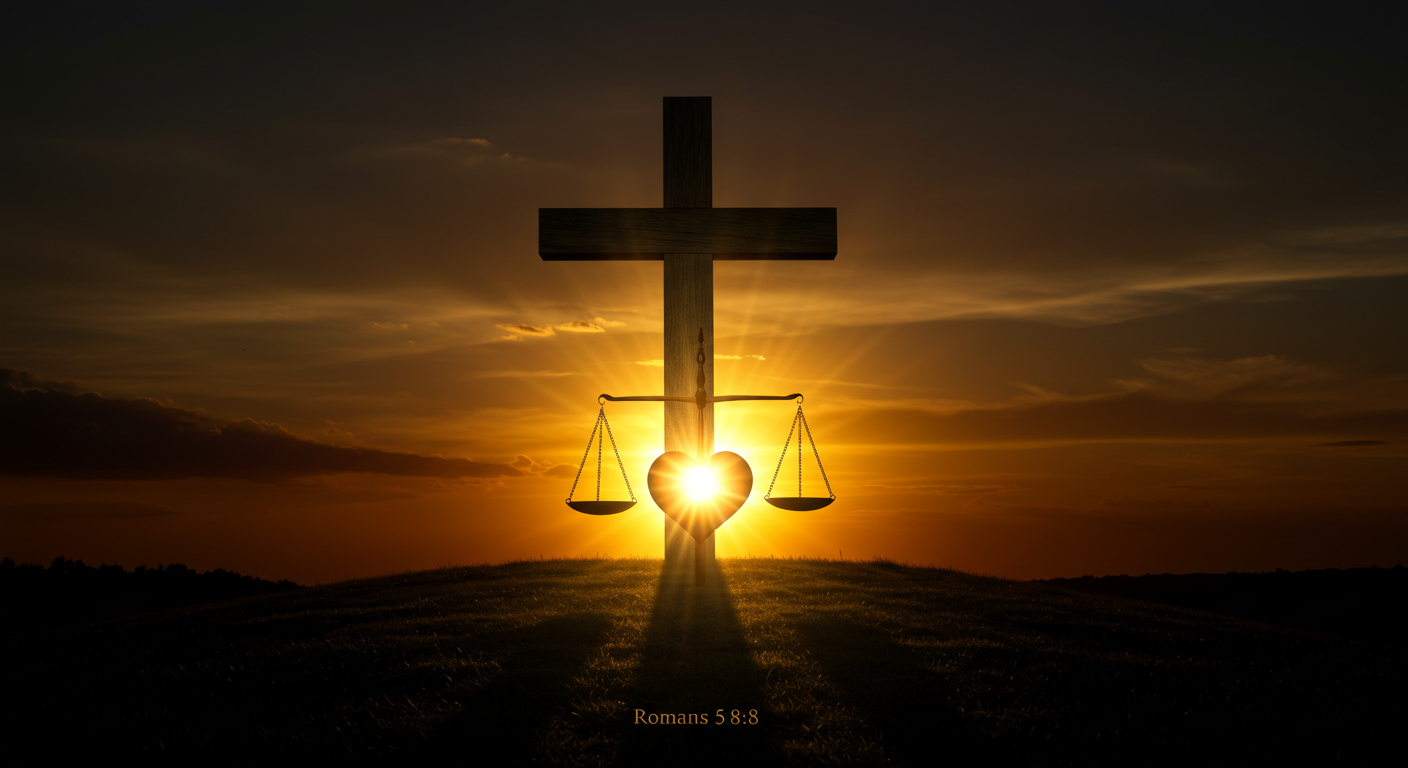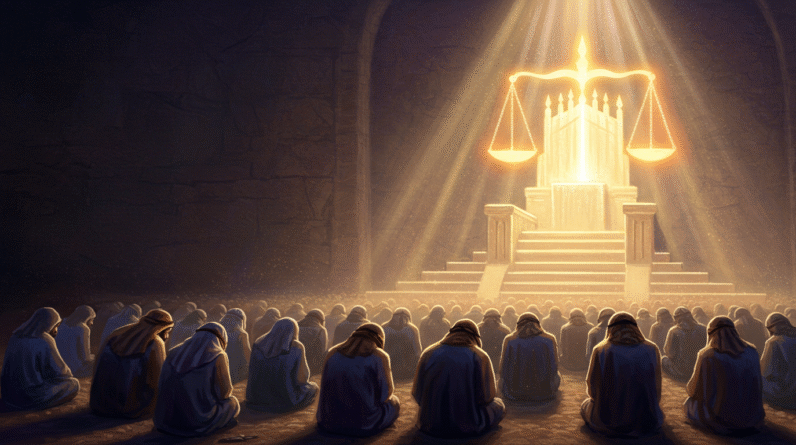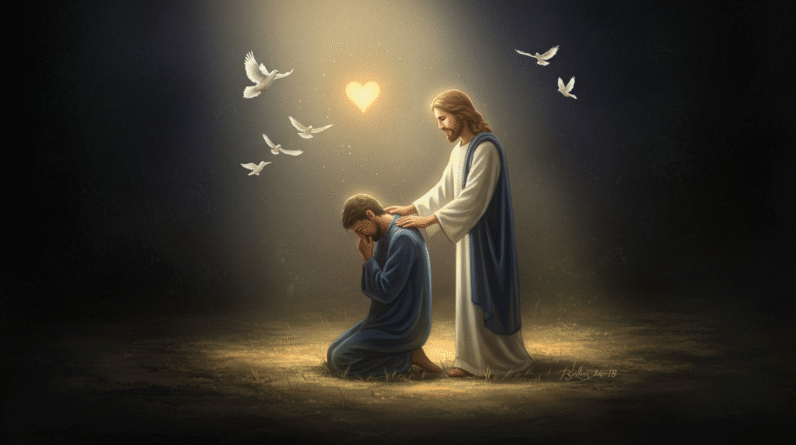conversational, second-person way.
The Cross—Where Love And Justice Meet (Romans 5:8)
When you stand at the foot of the cross, you’re confronted with a truth that takes your breath away: God loves you and God is just. These are not two competing attributes of God; they are two sides of the same divine character, harmonized perfectly in Jesus Christ. As you explore Romans 5:8, you’ll find the heartbeat of the gospel — that while you were powerless and estranged, Christ died for you out of unabashed love, and in His death God satisfied the demands of justice on your behalf. See Romans 5:8 for yourself: Romans 5:8.
Why this matters to you
This matters because you live in a world that wrestles with both injustice and need. You’re aware of hurt, brokenness, and the sting of wrongs done to you and others. You also long to know that God cares about mercy. The cross doesn’t sweep justice under the rug nor does it ignore love; it addresses both. When you understand how love and justice meet at the cross, your faith becomes both comforting and morally compelling.
Understanding Romans 5:8 in context
To understand Romans 5:8, you have to hear the larger music Paul is playing in his argument to the Romans. Paul is showing that God’s righteousness and love are not opposed. They converge in the work of Christ, who dies for sinners so that God’s justice can be satisfied and His love displayed. Read the verse and its surrounding context to let the text shape you: Romans 5:8 and consider the nearby verses Romans 5:6-11.
The plain reading: God’s action, your position
Paul’s point is simple and stunning: while you were helpless, ungodly, and even an enemy of God, Christ died for you. This shows God’s love in the face of your unworthiness and God’s justice in that He deals with sin through the death and resurrection of Jesus. Your position before God is transformed not because you clean up first, but because God acts first in mercy and justice. See also Ephesians 2:4-5.
Defining love and justice as God displays them
You need to see how Scripture defines the terms so you don’t make them idols or reduce them to human categories. God’s love is active, sacrificial, and self-giving. God’s justice is holy, impartial, and demands that sin be dealt with. Both attributes are rooted in God’s character and revealed in His dealings with humanity.
God’s love: active and sacrificial
The New Testament shows love most clearly in Christ’s action on the cross — not a vague sentiment, but a costly commitment. John puts it plainly: “This is how God showed his love among us: He sent his one and only Son into the world that we might live through him” (1 John 4:9). You see love that seeks you, loves you while you’re a sinner, and gives itself away for your redemption. Consider also the familiar assurance of John 3:16: God’s love is the motive for sending Jesus.
God’s justice: holy and necessary
Justice in Scripture is not mere retribution; it is the right ordering of all things according to God’s holy standard. Sin is real, and because God is holy, sin cannot stand unaddressed. You see God’s justice in passages like Psalm 89:14, which says righteousness and justice are the foundation of God’s throne, and in the prophetic calls for righteousness such as Micah 6:8.
The Old Testament foreshadows the meeting
You can trace God’s plan through the Old Testament — it isn’t a new idea that God cares for the oppressed and yet cannot simply ignore sin. From the sacrificial system to the prophets, God both expresses mercy and demands atonement. These shadows point to the cross, where mercy and justice meet once and for all.
Sacrifices and atonement
The sacrificial system made clear that sin required a cost. Levitical sacrifices were grim reminders that wrongdoing could not be reconciled without a substitute bearing the penalty. Read about the necessity of blood for atonement in Hebrews 9:22, which echoes the pattern you’ll see fulfilled in Christ. The temple sacrifices were not the final answer, but they trained your heart to see that redemption is costly.
Prophetic justice and mercy
The prophets insist that God desires mercy as well as sacrifice. Hosea, Isaiah, and Micah speak of a God who longs to forgive but whose holiness demands righteousness. For example, Hosea 6:6 declares God’s desire for steadfast love rather than mere ritual; yet God’s words through the prophets also call people to repentance. The narrative of Scripture builds an expectation: God will act decisively, and He will act lovingly.
The New Testament fulfillment: Jesus’ life, death, and resurrection
When Jesus comes, you see the convergence of love and justice lived perfectly. He teaches mercy, heals the broken, comforts the poor, and calls sinners to repentance. Yet He also speaks of judgment and bears the weight of divine wrath on the cross — showing that God is both merciful and just.
Jesus fulfills the law and the prophets
Jesus says He came not to abolish the law but to fulfill it (Matthew 5:17). That fulfillment includes the righteous demands of God and the compassion God has for the lost. When you read the Gospels, you see Jesus confronting hypocrisy, calling for repentance, and yet extending forgiveness with lavish grace. He embodies the balance Scripture has always held together.
The cross as substitution and victory
The cross is where substitution happens and where victory is won. Isaiah prophesied about the suffering servant whose wounds bring healing (Isaiah 53:5). In the New Testament, Paul explains that God presented Christ as a sacrifice of atonement to demonstrate His righteousness because in His restraint He had passed over sins previously committed (Romans 3:25-26). The cross satisfies justice because sin is punished in Christ, and it displays love because Christ takes that punishment willingly for you.

How the cross balances love and justice
You might wonder: how can justice be satisfied if love forgives? The cross shows you the answer — justice was honored because sin’s penalty was paid, and love was displayed because God paid it Himself for your sake.
Justice honored in substitution
God’s holiness required payment for sin. Jesus’ death is not a conveniently painless way out; it is the just consequence of sin borne by the righteous for the unrighteous. Paul explains how God’s righteousness is shown in the justifier: through Christ’s sacrificial death, God can be just and declare sinners righteous (Romans 3:26). In other words, justice is not compromised; it is fulfilled in the cross.
Love revealed in voluntary sacrifice
At the same time, the cross is the supreme demonstration of love because Jesus laid down His life for you. The apostle John writes that God showed His love by sending His Son as a propitiation for your sins (1 John 4:10). Love does not ignore what is right; it assumes the cost and pays it for the sake of the beloved. Your salvation is not a moral loophole; it is a gift purchased by the blood of Christ.
The cross as both comfort and convictor
When you stand under the cross, you receive comfort and challenge in equal measure. You’re comforted because God loves you enough to rescue you. You’re convicted because the same God will call you to live a life that reflects His justice and mercy.
Comfort: you are known and loved
If you are burdened by guilt or wandering in doubt, the cross is the place of comfort. Paul reminds you that while you were still a sinner, Christ died for you (Romans 5:8). That means God reaches toward you before you take a single step. This truth is both tender and humbling: you can come to God with your failings because His love is not contingent on your perfection. See also Ephesians 2:4-5.
Conviction: You are called to righteousness
Comfort does not let you stay as you are. When God’s love has transformed you, He calls you to live out that love in justice. James reminds you that faith without works is dead (James 2:17). You are called to be just as God is just, merciful as God is merciful. The cross equips and empowers you to care for the oppressed, stand against wrongdoing, and actively pursue righteousness.
Practical ways the meeting of love and justice shapes your life
The theological truth of the cross should translate into practical living. When you understand how love and justice meet at Calvary, it changes how you treat your neighbor, respond to injustice, and pursue holiness.
Personal holiness and social responsibility
Your faith should transform your character and your actions. Personal holiness is not an optional private matter; it’s a visible reflection of God’s transforming work. At the same time, God’s justice compels you to care for the vulnerable. Micah’s call to do justice, love mercy, and walk humbly with God (Micah 6:8) should shape both your private life and public action.
Forgiveness that does not ignore wrong
You learn to forgive while not excusing sin. Forgiveness is costly because it takes seriously both the wrong done and the healing needed. You can forgive because Christ bore the ultimate penalty, but you should also seek restoration and justice where possible, always guided by wisdom and love. Jesus teaches you to forgive repeatedly, but He also calls communities to hold one another accountable (see Matthew 18:15-17).
Advocacy that reflects God’s heart
You are called to be a voice for the voiceless and a defender of justice because the God you serve is both loving and just. Scripture consistently links worship with justice: “He has shown you, O mortal, what is good. And what does the Lord require of you? To act justly and to love mercy and to walk humbly with your God” (Micah 6:8). Your advocacy should flow from humility and compassion, not from pride or partisanship.
Obstacles you’ll face when living between love and justice
You’ll be tempted to tilt too far in one direction: to sentimentalize love without holiness or to pursue justice without mercy. The cross warns you against both extremes.
Avoid sentimentalism
If you reduce Christianity to mere warm feelings, you’ll miss the holiness and the cost of following Christ. True love is costly because it bears burdens and calls people to repentance. You must be wary of a gospel that comforts without transforming. Paul warned that not all that looks loving is faithful to the truth; love without truth risks harming those you want to help.
Avoid cold legalism
On the other hand, legalism can masquerade as righteousness while stripping away compassion. A people who only judge will become brittle and isolated. The cross calls you to justice that is tempered by mercy — righteousness without compassion is not the character of God.
How you personally respond to the meeting of love and justice
Your response matters. The gospel invites you into a posture of receiving and giving — to receive God’s mercy and to extend it to others in ways that uphold justice.
Receive the mercy that satisfies your conscience
First, you must receive the gospel. You cannot manufacture forgiveness by good works; you receive it through faith in Christ’s finished work. Paul explains that you are justified by faith, and the peace with God comes through our Lord Jesus Christ (Romans 5:1-2). Rest in the assurance that God’s justice has been satisfied in Christ, and let that settle your conscience.
Pursue a life shaped by gratitude and obedience
When you grasp that you were loved while still an enemy, gratitude will overflow into obedience. You are not saved by obedience, but you are saved for obedience. Let your gratitude shape the choices you make, the way you treat others, and the causes you champion. Jesus said the greatest commandment is to love God and to love your neighbor (Matthew 22:37-39). Live that out.
Pray, confess, and act
Let prayer be the fuel of your life. Confess your sins and ask for the Spirit’s help to love and act justly. James tells you to confess your faults to one another and pray for one another (James 5:16). As you pray, look for practical ways to serve: feed the hungry, advocate for the oppressed, forgive the offender, and seek peace.
Stories of love and justice meeting
History and Scripture give you vivid portraits of the way love and justice can be reconciled in human lives when Christ transforms hearts. You see it in the Good Samaritan, in the early church’s care for widows and orphans, and in modern believers whose faith moves them to sacrificial service.
The Good Samaritan: mercy with moral clarity
In Luke 10:25-37, Jesus tells the story of a man who was robbed and left for dead. The Samaritan’s compassion was costly and practical — he acted on mercy, provided care, and took responsibility. That parable challenges you to combine mercy with action; love moves you to redress wrongs as you can.
The early church: generosity and justice
The early church shared possessions so there would be no needy among them (Acts 4:32-35). Their response to injustice was rooted in the gospel: believers cared for one another out of grateful love, thereby embodying God’s justice for the poor and marginalized. You are called to imitate that generosity.
The cross and your assurance of salvation
Assurance is not arrogance; it’s humble confidence grounded in Christ’s finished work. The cross gives you a sure basis for hope because God’s righteousness has been fully expressed in Christ’s sacrifice.
Peace with God because justice is satisfied
Through faith, you have been justified and have peace with God (Romans 5:1). That peace rests on the fact that the penalty for your sin was paid and that the justice of God stands fulfilled in Christ. This is not a theological abstraction — it’s your daily rest in the mercy of God.
Love that compels you forward
Assurance of salvation should propel you into mission. When you know how deeply you were loved, you can’t help but tell others. The apostle Paul wrote that Christ’s love compels him (2 Corinthians 5:14). You should let that same compelling love move you toward both evangelism and justice-making in the world.
Final reflections: let the cross shape you
You’ve seen how the cross harmonizes God’s love and justice. Don’t let this be merely interesting theology; let it be the anchor of your life. The cross frees you from despair and arrogance, calls you to repentance and service, and sends you out as an ambassador of a God who is both compassionate and righteous.
Hold both truths together
Resist reducing God to either pure love without holiness or pure justice without mercy. The God revealed in Scripture is both loving and just. When you hold these truths together, your faith will be robust and your witness compelling.
Live like the cross is true
If the cross is the center of reality, then you will live differently: loving the unlovable, seeking justice without losing mercy, and pursuing holiness without pride. Let your life be a small echo of the cross — costly love that honors God’s justice and extends mercy to those around you.
A prayer to close
Lord Jesus, you who stood in the place of sinners and bore the weight of God’s justice out of love, teach me to live in the light of your cross. Give me the courage to love as you loved, and the strength to act justly as you are just. Shape my heart so that mercy and truth meet in my life. Amen. For encouragement and daily strength, return to the Scriptures: meditate on Romans 5:8 and let that truth hold you.
Explore More
For further reading and encouragement, check out these posts:
👉 7 Bible Verses About Faith in Hard Times
👉 Job’s Faith: What We Can Learn From His Trials
👉 How To Trust God When Everything Falls Apart
👉 Why God Allows Suffering – A Biblical Perspective
👉 Faith Over Fear: How To Stand Strong In Uncertain Seasons
👉 How To Encourage Someone Struggling With Their Faith
👉 5 Prayers for Strength When You’re Feeling Weak

📘 Jesus and the Woman Caught in Adultery – Grace and Mercy Over Judgement
A powerful retelling of John 8:1-11. This book brings to life the depth of forgiveness, mercy, and God’s unwavering love.
👉 Check it now on Amazon
As a ClickBank & Amazon Affiliate, I earn from qualifying purchases.
Acknowledgment: All Bible verses referenced in this article were accessed via Bible Gateway (or Bible Hub).
“Want to explore more? Check out our latest post on Why Jesus? and discover the life-changing truth of the Gospel!”








